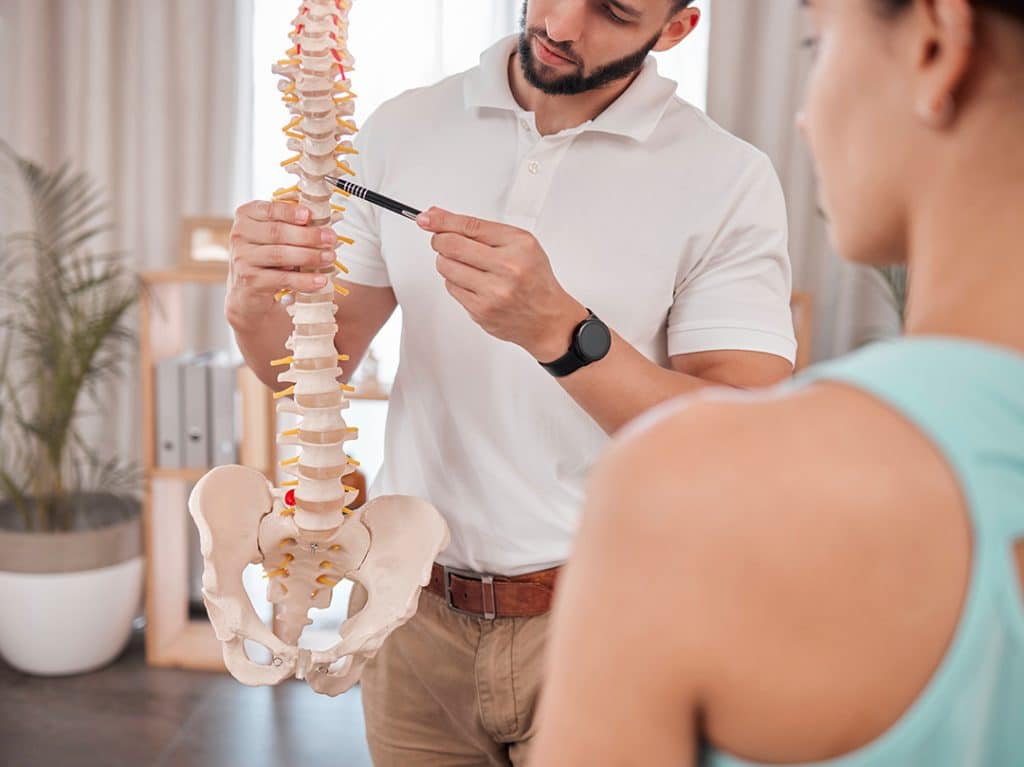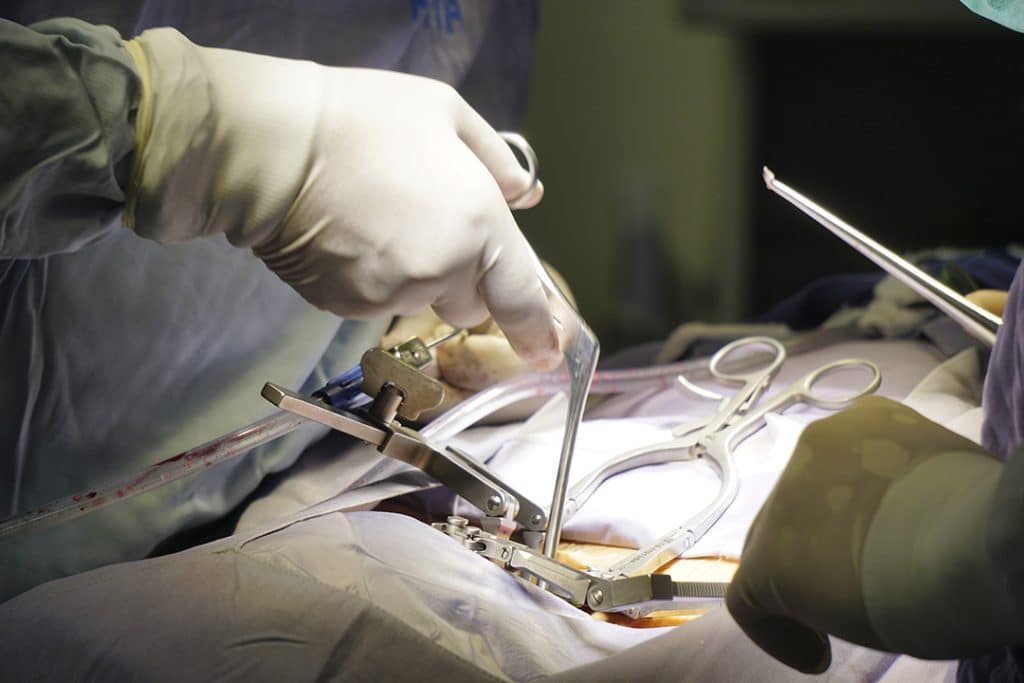Before jumping to surgery for herniated disc repair, try chiropractic care for a gentle, non-invasive solution.
If you’ve ever experienced the relentless pain and discomfort of a herniated disc, you know how quickly it can take over your life. The frustration of limited mobility, the nagging ache that just won’t let up, and the looming uncertainty about your healing can be overwhelming.
But here’s the thing: you have options, and your spine can heal. Chiropractic care offers a non-invasive, gentle, and effective option, making it a valuable first-line treatment choice for many people with herniated discs.
Read on to learn more about disc herniations and how chiropractic might be the solution for you.
Understanding Herniated Discs

Are you struggling with the pain of a herniated disc? The first step to getting sustainable relief is understanding what a herniated disc really is and what causes discs to herniate in the first place.
What is a Herniated Disc?
A herniated disc, also known as a slipped or ruptured disc, is a spinal condition that occurs when the soft inner core of a disc in the spine pushes through a crack or tear in the tough, outer layer. These discs act as cushions to absorb shock between the vertebrae in the spine, which gives your spine flexibility and support. However, when a disc herniates, the material from the inner core can press against nearby nerves, which causes pain.
Causes of Herniated Discs
Herniated discs are common, especially if you live an active life. Here are a few of the most common causes of herniated discs.
> Age
As we age, the discs in our spine naturally degenerate and become more susceptible to herniation.
> Injury
Trauma or injury to the spine, such as a fall or car accident, is a common reason why discs herniate.
> Repetitive Strain
Repetitive movements or activities that involve heavy lifting, twisting, or bending the spine can increase your risk of a herniated disc.
> Genetics
Some people simply have a genetic predisposition to disc problems, making them more susceptible to herniation than others.
Who is Most at Risk of a Herniated Disc?
While herniated discs can affect anyone, certain factors can increase your risk:
> Age
The older you are, the more degeneration occurs in the spine. However, individuals between the ages of 30 and 50 tend to be most prone to herniation, likely because they are still active and have more opportunities for injury.
> Occupation
Jobs that involve heavy lifting, prolonged sitting, or repetitive motions can increase the risk of herniation.
> Obesity
Excess weight places additional strain on the spine and often leads to disc problems.
> Smoking
Smoking can weaken the discs, making them more susceptible to herniation.
Common Symptoms of a Herniated Disc
No two backs are the same. The symptoms of a herniated disc can vary depending on the location and severity of the herniation, as well as your general state of health. But, there are some common symptoms that most people experience:
- Pain that feels sharp, burning, or shooting
- Numbness and tingling
- Muscle weakness
- Trouble with mobility or coordination
- Reduced reflexes
Common Pain Relief Solutions for Herniated Discs

When it comes to managing herniated discs, there are various treatment options available, each with its own advantages and considerations. Let’s explore some of the most common treatment options available, so you can choose a path forward that works best for you:
1) The “rest and wait” method.
Some minor herniations can improve with some strategic self-care and time. Rest, along with the application of ice or heat, can help reduce inflammation and alleviate pain.
This method is a non-invasive and low-cost option that can provide relief for mild herniated discs. But, be prepared to wait. Getting relief solely from self-care will take time. And if your disc herniation is more severe, you may not get relief this way at all and may need to look to other options.
2) Nonsteroidal anti-inflammatory injections
Injections of nonsteroidal anti-inflammatory drugs (NSAIDs) directly into the spinal area are a popular resort for those with severe pain who want fast results.
These injections can reduce the inflammation and pain associated with herniated discs, but they don’t address the root cause of why your disc is herniated in the first place. This means your relief is likely to be temporary, and you are still at high risk for future herniations. Plus, repeated injections can have some negative side effects and may stop providing relief after a while.
3) Surgery
Procedures like discectomy or spinal fusion aim to remove or stabilize the herniated disc. These procedures can often provide immediate relief for severe pain or neurological symptoms, but these invasive surgeries are a last resort option. They carry potential risks as well as a long recovery period. Surgery should only be considered when non-invasive, holistic treatments have been exhausted and haven’t offered the relief and healing you need.
4) Chiropractic care
Too often, patients come to chiropractic care after multiple NSAID injections or an invasive surgery that didn’t work. The treatments didn’t work, and they are ready to try anything – including chiropractic – to get some sort of relief.
The truth is, chiropractic care should be one of the first treatments you consider for a herniated disc. Chiropractors are experts in spinal health and use light and gentle movements to adjust the bulging disc and help return it back to its original position. This alleviates pressure on affected nerves and stops the pain.
If you’re considering chiropractic care for a herniated disc or other spinal issue, it’s important to know that not all clinics treat herniations the same. It’s best to seek out a chiropractor who takes x-rays before adjusting you to ensure your highest level of safety and comfort.
Chiropractic Care vs. Surgery for Herniated Disc
Surgery should be a last resort for herniated discs, yet many people jump under the knife before they’ve tried less invasive options like chiropractic care. So, what’s the difference between these two treatment options?
Chiropractic Care for Herniated Discs

Chiropractic care is a conservative, non-surgical approach to managing herniated discs. It involves gentle spinal adjustments performed by trained chiropractors to address misalignments and relieve pressure on affected nerves. And don’t worry – adjustments are typically pain-free and actually provide relief shortly after (or even during) your session.
Like any root-cause modality, chiropractic care can take time to reach your full results. Some people notice improvement after just a few sessions, while others may require more consistent care over several weeks. The good news is that the relief you feel is true healing – not just a band-aid covering up the pain.
Benefits of Chiropractic for Herniated Disc
Chiropractic care has many benefits overall but it can also help herniated disc pain. Here are a few of the top benefits:
> Pain Reduction and Relief
Chiropractic adjustments can alleviate pain by repositioning the herniated disc and reducing nerve pressure.
> Reduced Swelling
By improving spinal alignment, chiropractic care can help reduce inflammation and swelling in the affected area.
> Fewer Muscle Spasms
Proper alignment can reduce muscle spasms often associated with herniated discs.
> Improved Posture
Chiropractic care can enhance posture (and reduce your risk of re-injury) by addressing spinal misalignments.
> Improved Breathing
Proper spinal alignment can also contribute to improved lung capacity and better breathing.
> Enhanced Mobility
Many individuals experience increased mobility and flexibility with chiropractic care.
> Short Recovery Time
Because chiropractic care is non-invasive, there is essentially no recovery or downtime between your treatments. Most patients return to their regular daily activities or enjoy a day of restful self-care on days they have chiropractic adjustments.
Herniated Disc Surgery

Surgery is an amazing medical technology that has improved – and even saved – countless lives. For those with severe disc herniations, surgery can be a direct way to stop the pain and repair your spine. But, going under the knife for any reason is a big deal. Herniated disc surgery is the most invasive approach to treating disc issues and should be considered a last resort when conservative treatments have failed.
The Downsides of Herniated Disc Surgery
While herniated disc surgery may seem like a faster way to get pain relief, there are also some major downsides. We’ve outlined just a few of them when comparing this option to non-surgical treatments and chiropractic care.
> Painful recovery
Surgery is inherently painful, and many patients experience discomfort during the recovery process.
> Potential risks
Any surgery comes with risks, including infection, bleeding, and anesthesia-related complications.
> Spinal damage
Nothing in medicine is guaranteed, and in some cases, surgery may not provide the desired relief. In worse cases, it can even damage the spine and nerves further.
> Future injury
Surgery doesn’t address the root cause of the herniated disc and doesn’t necessarily safeguard against new herniated discs developing in the future.
> Long recovery time
Recovery time after spinal surgery can be lengthy, typically lasting 4-6 weeks. Months of restricted activity and rehabilitation therapy are often needed to get you moving safely again.
Knowing Which Option is Best
Chiropractic care and surgery are both helpful options for herniated discs, but which is best for you and your back depends on your circumstances and preferences.
If you’re unsure which path to take to get lasting pain relief, reach out to your local AlignLife center to speak to an expert in herniated discs. They can help you determine if your situation would benefit from chiropractic as a gentle, first-line approach. In most cases, the answer is “yes”!
More Ways to Improve and Prevent Herniated Discs

While chiropractic care and other treatment options can provide significant relief for herniated discs, there are additional steps you can take to enhance your well-being and reduce the risk of future disc issues. Try these practical tips for improving and preventing herniated discs:
1) Maintain a Healthy Weight
Excess body weight can place added stress on your spine, which increases the risk of disc herniation. To keep your spine resilient and avoid herniated discs, adopt a balanced diet and engage in regular physical activity to achieve and maintain a healthy weight. Need help achieving your goal weight? AlignLife’s weight management program offers a natural and sustainable approach to losing weight and keeping it off.
2) Practice Proper Lifting Techniques
Herniated discs often happen after lifting something heavy, especially off the floor. When lifting objects, bend your knees, keep the object close to your body, and use your legs to lift, rather than straining your back. Avoid twisting while lifting heavy items. These habits will protect your back against unnecessary strain and prevent disc issues.
3) Do Spinal Stretches and Exercises Daily
Regular stretching and strengthening exercises not only keep you feeling young but can improve spinal flexibility and support. Focus on back exercises that strengthen the core muscles and promote good posture.
4) Maintain Good Posture
On that note, practicing good posture is another simple way to protect your spine against disc herniations. Poor posture places added stress on your spine, leading to increased signs of degeneration. Be mindful of your posture while sitting, standing, and walking. It’s also helpful to use ergonomic furniture and make any necessary adjustments to your workspace.
5) Quit Smoking
If you need another motivation to quit smoking, consider this: Smoking reduces blood flow to spinal discs, making them more susceptible to degeneration and herniation. But, quitting is easier said than done. Talk to your AlignLife chiropractor about finding support and resources to quit smoking and protect your spine.
Ready to See How Chiropractic Care Can Help You?

Back pain – whether caused by a herniated disc or any other reason – isn’t only uncomfortable, but it keeps you from living life on your terms.
If you’re dealing with a herniated disc or suspect you might have one, you have options. The first step is to reach out to an AlignLife center to see if you’re a good candidate for chiropractic care. Connect with an AlignLife provider today to learn more or schedule your first visit!
Know someone with herniated discs?
Share this article so they can discover the difference chiropractic care at AlignLife can make.



